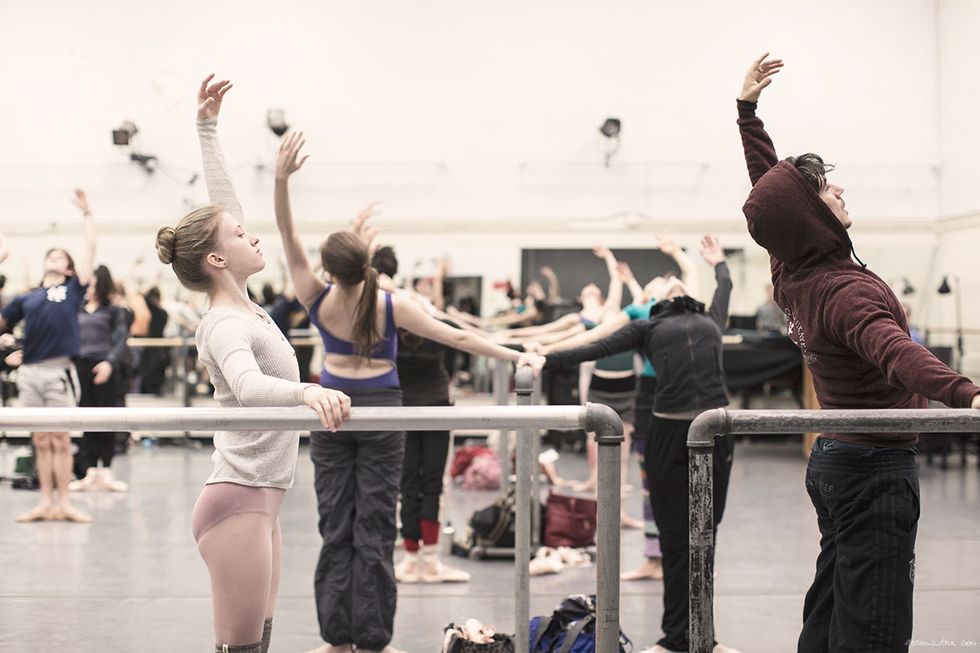Those of us in the ballet world know the atmosphere of a classroom to be certain way. There’s a culture surrounding what we do, and that culture celebrates its high holidays during that hour and a half of class time. If you’ve been involved for a certain amount of years, you’ve picked up on nuances of teachers that you can’t help but notice: the teachers tends to notice, compliment, and correct specific people in the room. This might seem frustrating after a while, but you eventually accept it and it becomes a norm of the classroom setting.
As you progress through your training from place to place, this variable stays consistent. Sometimes you are the one getting more attention, sometimes you are not. More often than none, this situation is irritating and uncomfortable for all in the room. So is favoritism in ballet a problem, or a staple of the business?
When you’re in a field that is mostly based on appearance, it’s easy to see how favoritism exists. The eye naturally is drawn to one who is most aesthetically pleasing to the person standing in front of the room. When auditioning, this is a natural occurrence that can make or break your career. But as a student in your regular technique class, this feels unfair and wrong. Considering the goal of a teacher is to improve the technique of all students, it feels terrible when a teacher singles out one particular student to specifically improve over others.
Favoritism leads to a hostile environment among the dancers. Those who feel ignored start to feel angry and resentful towards both the person in charge and the students getting more attention. They start to nitpick everything “wrong” about the other dancers in the room, start to question every little comment made by the teacher towards anyone and everyone. And those who are the favorites feel guilty. They feel guilty for the attention, they feel guilty when they make a mistake, and they feel like every eye in the room is watching them, silently waiting for a trip or a fall or something to prove they aren’t a god. They actually feel guilty for improving, for doing well, and for being themselves in the studio. Dance goes from being enjoyable to a mind game, and creates a toxic cycle within dancers’ heads. Suddenly they hate themselves, their fellow dancers, the teachers, the director, and their company, and feel dissatisfied with their work completely. Morale goes down, work ethic goes down, and this is definitely not what we signed up for.
It becomes specifically frustrating when favoritism follows from the classroom to casting. It’s never a surprise when you see a director’s “favorite” get the lead over others. But knowing that doesn’t make you feel any better when you see it come true on the cast list.If you’re struggling with favoritism in your ballet class, understand two very important things: it’s out of your control, and it goes away. If it’s happening to you now, try to ignore it to the best of your abilities, and fully dedicate all your energy to your own progression and roles. And just know the higher up you go into the dance world, the more favoritism and unfairness you’ll experience. However, the farther you go in your own dance career, the thicker your skin will get, the more inwardly focused you’ll become and the more you’ll be able to ignore it. While ignoring it doesn't actually make it go away, it makes you unable to see it. Out of sight, out of mind.
I wish I knew as a young dancer that it wasn't just one teacher, but in fact every dance teacher that has some favoritism in them. I would have learned to ignore it much sooner in my life, improved without comparing myself to or complaining about the favorites, and I would've enjoyed dancing much more.
So: is favoritism in ballet just how the field works? Or should it be addressed? Can it be stopped? Or is it just human nature? Is it immoral? Or is it just jealousy? In all honesty, to rid the ballet world of favoritism would require re-wiring the human brain. People just pick favorites; sometimes it's food, sometimes it's colors, and sometimes it's even a person. While it's wrong on paper, it's impossible to be 100% impartial and treat every single person in the room exactly the same. That doesn't make it any better, but knowing this information could help you to move past it. Ignore favoritism, do your thing, and enjoy what you're doing. You'll appreciate it later when you appear focused and hardworking instead of butt-hurt and stubborn.
















